- Home
- Edward Cline
Hugh Kenrick Page 6
Hugh Kenrick Read online
Page 6
Hugh’s face turned red. He had forgotten the Earl, and he wished he had no reason to remember him. “No, Pater. I shan’t forget it.”
When they came to farms, the Baron said, “Turnips, you see, do not deduct from the soil. They add healthiness to it. My plan is to have all the tenants let crop fields lie fallow and sown with turnips, and instead of feeding the cattle by letting them wander over a fallow field, require the tenants to harvest turnips and feed their stock in pens and stables. This will prevent damage by stock to the fields. It will also simplify the care of stock in winter. I plan to eliminate untreated dung from the fields—and with it flies, which are thought by some to cause certain ailments.”
His father, Hugh learned, encouraged the cultivation of clover, sainfoin, and lucerne grasses for fair-weather cattle grazing, and mandated the practice of sowing seed by hoe and drill. The Danvers sheep population was evenly divided among the Cheviots, Muggs, and Silverdales. In the town, the Baron had established a “factory” which used a fly-shuttle and hosiery frames, to which the tenants brought their shearings. Danvers produced some of the finest serge in the south of England, which found ready buyers in Exeter, a closer market than was London. Garnet Kenrick carried with him a little book of notes in which was itemized the tasks he had given each tenant on previous tours. Hugh noted that while many of the tenants greeted his father with some cheer and familiarity, their inquiries after the health of the Earl were more a reluctant afterthought than genuine concern. It was as though his father were a respected Apollo, and his uncle a feared Zeus.
One evening, while they rested in a tenant’s cottage, Hugh said, “What wonderful material those sheep are! I shall write a play!” Owen, the valet, had just finished serving them a meal at the rickety table, and was busy with chores by the fire he had lit. The tenants, a man, his wife, and three children, had retired to the stable to share straw with their cattle. The Baron had invited them to stay, but the tenant, out of respect for his master, had insisted on spending the night with his livestock.
The Baron exchanged interested glances with Owen, the valet. “About sheep?” asked the father.
“No,” said Hugh. “About men. I mean, about families. They shall be the Cheviots, the Muggs, and the Silverdales. It will be a farce.”
“A farce?”
“About our families.” Hugh paused. “We will be the good family—the Silverdales,” he assured his father. “But they will all act like sheep.”
The Baron laughed, and Owen grinned. “I don’t know as I like being cast as a sheep, Hugh.”
“You will be the smartest Silverdale. The Muggs will be the Brunes, and the Cheviots will be the Tallmadges. I will make people laugh!”
“Well,” said the Baron, not certain of the seriousness of his son’s ambition, “you may also make others angry. Has your tutor not yet taught you the misfortunes of John Dryden, and of Defoe, and John Gay? Near-death at the hands of an offended statesman’s ruffians—for satirical remarks on that man’s character—gaol and the pillory for mocking the government’s policies—and enforced literary eclipse. Ah, the pugnacious phrase, the skewed allusion, the hurtful rhyme!” exclaimed the Baron with a shake of his head. “Riskier business than piloting a leaking merchantman into port in a storm!” He noticed the curious look on his son’s face, and added, “But, I’m sure that you would compose nothing of that ilk.”
Hugh leaned across the table anxiously. “You would not be offended by it, would you, Pater?”
“I? Heavens, no, for I would know that you meant me no malice. Your mother might even feel flattered by the attention, and I’m sure you would do her justice. But if you wrote such a fable, you must have some object in mind, some custom, or foible, or hypocrisy that you wished to mock, and some character in your opus must be a paragon of it. And he must be confounded in the end, and made the object of contempt. And though you may cloak your cast in several varieties of wool, it would be less the verse or the prose that would cause people to laugh, and more the sly inspiration for that object. Your ‘mocked man’ must deserve his shearing, if you will allow the analogy. Nothing is so silly-looking as a sheared sheep, and sillier-looking still is a sheared ram, and many of his biped kin have the run of society. The foolish and the corrupt may be audacious in their actions, or blind or indifferent to their foolishness and corruption, but never so blind or foolish that they would not savor vengeance. For, you see, Hugh, mirth and mockery can be more stinging than an undisguised truth, and outlive both their author and his object.”
“By your leave, your lordship,” interjected Owen, who was cleaning the Baron’s muck-covered boots by the fireplace, “if I might construe your epistle? How many poets have purchased immortality at the price of their lives?” He paused and turned to address Hugh. “That is what your father the Baron is telling you, milord.”
“Why, Owen!” exclaimed Garnet Kenrick with a laugh, “How perfect a way to putting an end to my blather! I could have gone on for hours! I’m in your debt!”
The valet raised his eyebrows and smiled with half-serious emphasis. “A shilling a month more in my wages would make me happy, your lordship.”
The Baron replied without hesitation. “You shall have two, Owen.”
For a reason he could not then fathom, Hugh learned more about men, from this short exchange between his father and the valet, than he did from his father’s epistle.
* * *
When they returned from the tour, they found that the Earl had gone to London. “Urgent business that needed his special attention,” explained the Baroness to her husband. “He would not say what it might be, although another of Hillier’s men arrived with a message. He said he may have a surprise for you when he returns.”
The Baron grinned. “Danvers will be ours for a while.”
The Kenricks had a placid week during the absence of the Earl. They did not acknowledge the peace, but it was real to them all the same. When the Earl returned, he was beaming after his own fashion. He immediately called his brother into his own study and poured them both glasses of port. “We want a guaranteed purchaser of our serge,” he explained. “That would be Fenwick, in Exeter. Fenwick wants a share of the contracts to supply the army with clothing. That would be Wraxall, in Army Supply. Wraxall has the close ear of the Duke. I have been to see Wraxall—and the Duke, who granted me a short audience, thanks to Wraxall. I have convinced him of the quality and dependability of Fenwick, who would never be granted an audience, as he is a mere commercial commoner. The Duke will grant him a large contract, once he has seen our sheep and our serge.” The Earl drained his glass of port, and helped himself to another. He fell back into his chair and seemed to gloat.
The Baron stood with his untasted port. “He is coming here?”
“In three months. In January, to be precise. Not exclusively to visit Danvers. He will be making a tour of the south coast to evaluate defenses in the larger port towns. He will be accompanied by a modest entourage. He will stop here for a night or two. We must prepare for this occasion.”
“A royal visit…,” murmured the Baron.
“I know what you’re thinking, dear brother. I can picture you despairing over the chaos in your neatly kept ledger books. You should see the look on your face! How costly an affair! The entertainment, the food, all the incidental expenses of putting up a large, important man and his train. But—think of the benefits, think of the gains! A contract to supply the army with its jackets, breeches, and blankets! The contract would be two-fold: one with Fenwick, and one with Danvers. Fenwick is part-owner of a dying establishment in London.”
“I know,” said the Baron, sitting down on the edge of an armchair as though it was too delicate to take his weight.
“Yes, you know.” The Earl grunted once. “But it was an opportunity you neglected.”
The Baron put his glass aside on the table. “How did Hillier come upon this opportunity?”
“He has friends in the ministry, and he heard about it. He introduced hims
elf to Wraxall.”
The Baron thought for a moment before he spoke again. “Is there to be another war?”
The Earl shrugged his shoulders. “Not that I know of,” he replied. “Neither does Wraxall, nor the Duke. It’s a matter of laying up supplies.”
“How is the Duke?” asked the Baron abstractly.
“In the best of spirits, despite the albatross of unpopularity nesting on his shoulders.”
“Did he thank you for the birthday gifts you sent him?”
“I did not think it opportune to jog his memory of them. It seems he chose to see me in the middle of an impromptu meeting of the Jockey Club at his lodge, in Windsor Park. The subject was some sickly Arabian studs he bought from another member, and he was so fit to be tied that I thought he might be short with me. But he was most gracious and accommodating, and we had a very amiable chat.”
“Have you discussed this with Fenwick?”
The Earl frowned. “Good lord, no! You deal with the man, not I. You’ve talked about him often enough.”
“I shall have to talk to him again and soon. It would have been wiser to await my return before you acted on Hillier’s message, dear brother. Fenwick shall be more surprised than I at this news.”
“Why?”
“If there are fruits borne of your efforts—if we are granted an exclusive contract—it will mean less serge for Fenwick to sell to the colonies…to Talbot in Philadelphia, for example, though Talbot is not our only purchaser. Fenwick has other commitments. The material has been spoken for by other factors. If he breaks his contracts with them, he may never see another.”
“Why should that concern us?” replied the Earl sharply. “We will be dealing directly with the Crown.” He shook his head in consternation. “Does this cornucopia displease you, dear brother?”
The Baron sighed. “It disturbs matters,” he said.
“If you are so concerned about Fenwick, we can purchase wool and serge from Tallmadge and Brune. You told me they must send their material to Bristol and London. We can purchase it from those people here—and they’ll thank us for the chance—and resell it to Fenwick, so he can meet his blasted commitments.”
“Perhaps,” said the Baron, who rose and began pacing. “But they have commitments of their own. We should have to make it worth their while to break them.”
The Earl poured himself another port. “There is no honor in commerce, dear brother. I don’t know why it should trouble you so. Good lord! If there were any, we should not be giving the Lobster Pots a living, or even Talbot or Worley, for that matter.” Benjamin Worley was the Kenricks’ commercial agent in London.
“It is honor that makes commerce possible, dear brother. And the law courts, when men lack it.”
The Earl merely sniffed at this truism. The brothers said nothing for a while. The candles burned steadily in their lamps, and the Dutch wall clock ticked away, measuring the Earl’s growing satisfaction and the Baron’s galling resignation.
Then the Earl said, “We shall need to hire extra servants for the occasion, Garnet. And tidy up the place. And the staff will need to be refreshed in royal deportment. That is especially important. We want no discourtesy shown the Duke. All courtesies paid the king must be paid to him as well. Fawkner, his secretary, has promised he will dispatch a chamberlain to instruct us more carefully in the proper etiquette. He will also send us a list of those to be in the entourage, so that we may prepare rooms.” The Earl paused to study his pensive brother. He seemed to derive some pleasure from having shaken his sibling’s certainty about business. “The town must be jollied up somehow, to greet the Duke. I shall prevail upon the Lord-Lieutenant to loan us some militia for the occasion. I read somewhere that he has a company of unemployed musicians. No doubt the Duke will be escorted by some cavalry. Billeting for them must be found, or constructed. The grounds could do with some pruning. What do you think? Should we have fireworks? That would be grand.” Then he remembered something. “Oh! How was the tour?”
Chapter 5: The Extraordinary
SIR EVERARD FAWKNER KEPT HIS PROMISE; A CHAMBERLAIN ARRIVED BY packet in Swanage two weeks later and drilled the Kenricks and their household in the courtesies required of them in all situations governed by a royal presence. For the Baron and Baroness, this was a tedious exercise, for they had already met the king and his family, in London at the celebration of the Treaty of Aix-la-Chapelle. But the Earl insisted that everyone participate. On the advice of his brother, the Earl reluctantly informed the Brunes, the Tallmadges, and other local notables of the Duke’s scheduled visit, and invited them to receive the same instruction, for no one else in Danvers had ever met or even seen royalty. On one hand, the Brunes and Tallmadges were envious; on the other, relieved, for such a visit, scheduled or surprise, would have impoverished them, and they knew that they could neither count on nor discreetly prompt the Duke’s generosity for compensation.
On the Earl’s order, the great Palladian house was cleaned and scrubbed inside and out, the portraits that lined the hallways and adorned the rooms were dusted and rearranged, the grounds pruned, the estate road replenished with new stones crushed by the workers in a Portland quarry in which the Kenricks owned a part interest. The Earl paid for bolts of red, white, and blue ribbon to be hung from the village’s windows and the single steeple of St. Quarrell’s church, and even ordered a new banner bearing the Kenricks’ coat-of-arms to be made; it would be flown from a staff near the mansion’s cupola. The Kenricks’ coat-of-arms was a stale thing concocted by an ancestor in the fifteenth century. It featured a shield with a griffin and wolf rampant, a bramble flower and a rose respectively clenched in their mouths, the creatures clinging to the bend in the shield. On a scroll beneath the shield was the Kenrick family motto: Vires facit veritas.
The excitement was so infectious that even Hugh Kenrick, usually aloof from the concerns of his uncle, felt a swell of anticipation. He, too, submitted to the chamberlain’s drills, and surprised the man and even his parents with the quickness of his learning. The chamberlain, in a droning, condescending tone, imparted the rules of royal decorum in an informal setting. “Unless otherwise waived by the Duke, all courtesies must be observed, without exception… At a dinner or other table, no one may eat or drink, or initiate a meal, until the Duke has begun his repast… No one may contradict or interrupt the Duke in any discourse or conversation on any whatsoever subject… The subject of Culloden Moor will not be mentioned in the Duke’s presence, nor will any questions, either supportive or mischievous, be entertained by His Grace on that subject… Ladies and children will not address the Duke, except in answer or reply to him… All persons must rise when His Grace enters a room, and sit again only if and when His Grace sits or he waives the courtesy… No person shall wear a white rose or ribbon in the Duke’s presence; a breach of this rule will be interpreted as a treasonous gesture, and the offender will be removed from the premises… His Grace is not his father the King, and so one may meet his glance, though not in an insolent or reproachful manner…”
Hugh memorized these and other rules, and excelled in the physical demonstration of deference. He had never before had to bow to anyone; the meaning of it was not lost on him. Curiously, he looked forward to the chance to bow to someone admirable. His parents and his uncle had painted such a glowing picture of the Duke in their dinner table conversation that the impending episode had a quality of magic for which he wished to be prepared. He imagined that a heroic god was coming to visit.
Hugh’s parents were secretly pleased that their son seemed to be happy, happy at home, happy with his tutors. He was even oblivious to the chronic disapproving scrutiny of his uncle. One day, after a footman brought him home from his lessons at the Tallmadge house, he rushed into his father’s study and handed him a sheet of paper. “Pater! It ought to be your motto!” he exclaimed.
His father read the single sentence on it that was written in a fine, elegant hand: O Fortunatas Mercatores! He grunted in appreciat
ion. “Oh, happy traders!” he said. He looked quizzically at his son. “My motto?”
Just then Hugh heard a rustle of silk, and the Earl came out of the shadows cast by the candles on the Baron’s desk. Hugh turned and glanced at his uncle, then at his father. “Yours,” he answered, “and Uncle’s.”
“Hardly the motto of a great family, Master Hugh,” remarked the Earl, who sat down in an armchair within the light.
“Under what circumstance did you come upon this idea?” asked the Baron.
“Mr. Cole gave us some sentences to put into Latin, and that was one of them.”
“Is not our mottonoble enough for you, dear nephew?” asked the Earl.
Hugh remembered that his uncle was having a new banner with the family coat-of-arms prepared for the Duke of Cumberland’s visit by the best seamstresses in the village. “It is not a proper sentiment for commerce, sir,” he replied in his defense.
The Earl merely hummed in answer.
The Baron chuckled. “I won’t deny that our business could use a motto to celebrate its success.”
“It’s from Horace’s Satires,” said Hugh.
“It’s a very formal language, Latin,” mused his father. “Don’t you think?”
“No one speaks it, Pater,” observed Hugh, “yet so much wisdom can be found in it.”
“True.” His father glanced sharply at his brother, and as though he were expressing some secret defiance, smiled and said, “Henceforth, Hugh, you may address me as ‘Father.’ And your mother, ‘Mother.’ My teeth gnash every time you address me as ‘Pater.’ It’s much too formal, you see.”
“Yes…Father.”
“All right, Hugh. Get along. Your uncle and I are discussing our status as fortunate traders.”
Hugh began to turn, but hesitated.
“Is something else on your mind, Hugh?”
“Yes, Father.” Hugh paused, then spoke. “Why may not one mention Culloden Moor when the Duke comes?”
The Baron shrugged. “It is a…sensitive subject,” he replied.

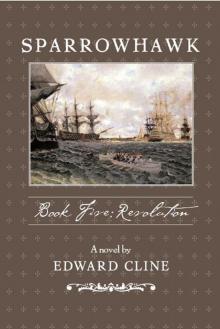 Revolution
Revolution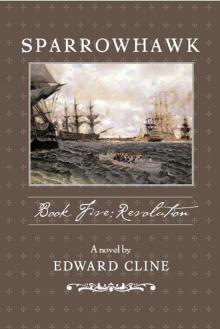 SH05_Revolution
SH05_Revolution War
War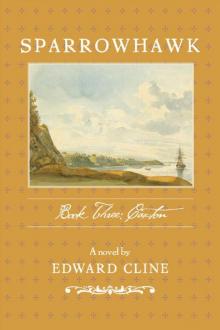 SH03_Sparrowhawk: Caxton
SH03_Sparrowhawk: Caxton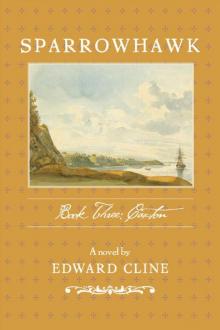 Sparrowhawk III
Sparrowhawk III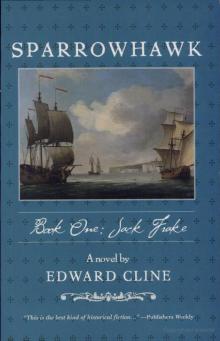 Jack Frake
Jack Frake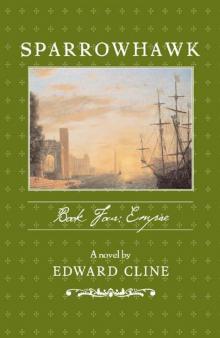 SH04_Empire
SH04_Empire Empire
Empire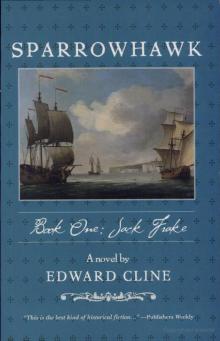 SH01_Jack Frake
SH01_Jack Frake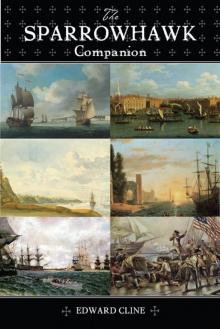 The Sparrowhawk Companion
The Sparrowhawk Companion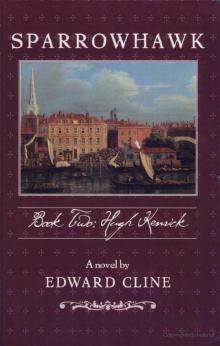 Hugh Kenrick
Hugh Kenrick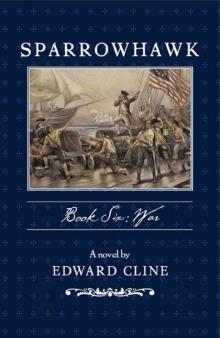 SH06_War
SH06_War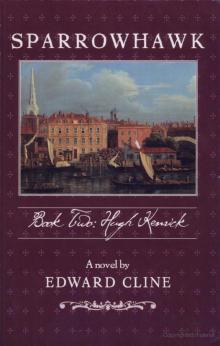 SH02_Hugh Kenrick
SH02_Hugh Kenrick